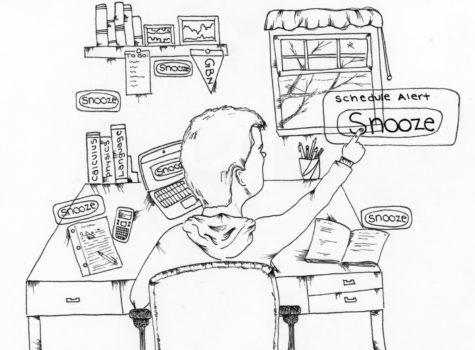Don’t sleep on the snooze button
It’s the crack of dawn on a dreary Monday morning, and I am jarred awake by a familiar sound. I roll over to assess the situation. It’s 6:50 a.m. If I hop out of bed now, I will have time to take a hot shower and maybe make myself breakfast, but the snooze button on my alarm clock beckons to me, once again overpowering any resolve I previously had to start my morning.
In the blink of an eye 30, minutes have passed, and I’m running late for school.
To make my situation even worse, I find myself pressing snooze outside of my bedroom.
Completing a homework assignment. Snooze. Running an errand. Snooze. Finishing a college essay. Snooze.
I’m addicted to snoozing.
Being able to push off an unavoidable problem for the sake of temporary relief provides a truly addictive sensation. Clearly, snoozing doesn’t foster a healthy lifestyle. Pushing off a problem for a brief moment of relief isn’t a lasting solution, because when a problem isn’t addressed, it doesn’t vanish. It gets bigger.
The initially simple reading you pressed snooze on becomes more difficult when you realize your book is nowhere to be found. That abnormally short math assignment you saved for the last minute becomes exponentially harder when you also have five additional assignments to make up. That science lab report becomes more stressful when you realize you managed to forget your notebook filled with data on your desk at school.
The simple solution to these predicaments would be to lay off the snooze button. But I’m not ignorant — I’m realistic.
I understand the craving for just 10 more minutes of blissful sleep or the temptation to hold off from an assignment you simply can’t motivate yourself to complete. And honestly, feel free to satisfy those impulses.
The best way to combat the negative consequences of the snooze button isn’t to stop snoozing altogether, it involves accounting for and acknowledging its effects on your schedule.
Start things earlier.
If a certain homework assignment usually takes an hour of productive work time to complete, give yourself an hour and a half. That way, when you inevitably spend a half hour on your phone browsing through social media, you aren’t put behind schedule.
In an ideal world, students wouldn’t get distracted or be unmotivated while completing their schoolwork. Yet, no student is perfect, which makes schoolwork less about being constantly productive and more about how students plan for the unproductive stretches during their studies.
By compensating for the time wasted from hitting the snooze button by starting earlier, you won’t be living your life entirely within the last minute.
Instead of rushing out the door in the morning on an empty stomach, there would be time to slow down and enjoy breakfast. Without the need to print an assignment during passing periods, there would be more time to socialize with friends. Rather than scrambling to fill out a crucial form minutes before the deadline, there would be time to actually complete it, correctly and thoughtfully.
So plan accordingly.
And don’t be surprised if I start to complain about setting my alarm for 6:15 a.m. After all, I need ample time to hit the snooze button.


